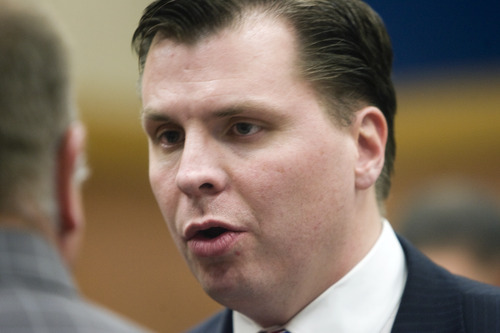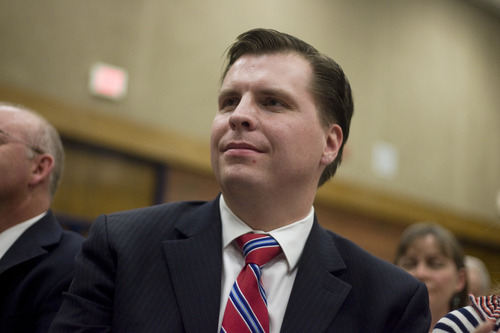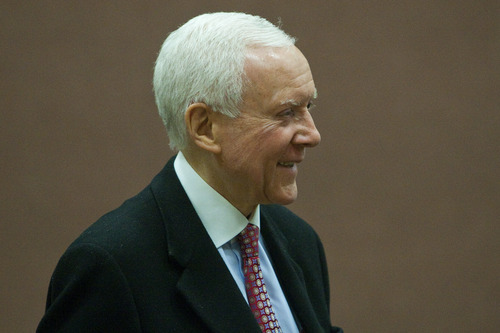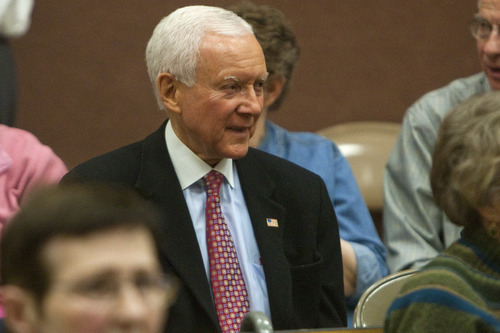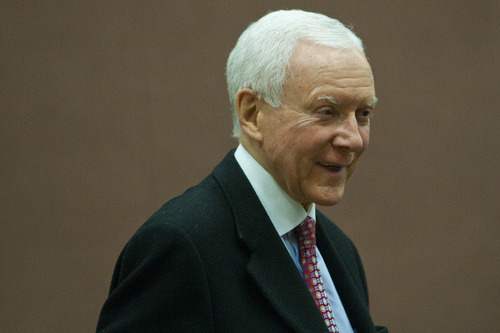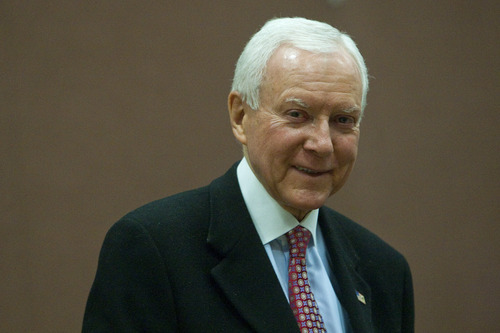This is an archived article that was published on sltrib.com in 2012, and information in the article may be outdated. It is provided only for personal research purposes and may not be reprinted.
In the wake of Thursday's Republican caucuses, Sen. Orrin Hatch's campaign was jubilant, challengers were left regrouping and other campaigns were trying to figure out what it all means for them.
Dave Hansen, Hatch's campaign manager, said staffers were still compiling data, but "the senator had a very good night."
"Let me just put it this way," Hansen said. "I don't think the senator is in danger of being eliminated at the state [GOP] convention and I do believe that the 60 percent [needed to win the nomination at convention] is definitely within the realm of possibility."
That's a far cry from Hatch supporters' earlier fears, sparked by the 2010 tea party-led convention ouster of three-term Sen. Bob Bennett, that the six-term Hatch could also be vulnerable.
Turnout at both the Republican and Democratic caucuses was tremendous. Estimated crowds as high as 200,000 people turned out for the Republican caucuses to choose 4,000 delegates to the state convention. Those delegates will gather April 21 to whittle down the field and perhaps choose a nominee.
Anecdotal reports from around the state indicate that Hatch delegates performed well, winning in places like Millcreek, Lehi, Eagle Mountain, Sandy, Draper, Ogden, Provo, Saratoga Springs, Herriman, Pleasant Grove, American Fork, Highland, Alpine and Farmington.
Hatch even picked up all three delegates elected in the Bountiful home precinct of Dan Liljenquist, believed to be Hatch's toughest rival.
"We had said from [the] beginning that we wanted to expand the pool of people attending the caucus," Hansen said. "I think our efforts, the party's efforts, the organizations' efforts made a difference and it paid off."
Liljenquist said that, as his campaign has called delegates Friday, the outlook is better than the Hatch campaign is making it appear.
"For a guy like me with low name recognition there's a lot of people that we need to introduce ourselves to and we're starting that process today … and we expect to be successful," Liljenquist, a former state senator, said Friday.
Liljenquist said his campaign appears to have done well on the west side of Salt Lake County, southern Utah, Weber County, parts of Davis County and other places that had a younger demographic.
And he said the support for Hatch is soft and the delegates are committed to listening to all the candidates, which gives challengers five weeks to help delegates make up their minds.
Hansen said that, in addition to the successful get-out-to-caucus efforts by the LDS Church and Republican Party, he believes voters were turned off by Freedomworks, a Washington-based conservative group, which spent more than $600,000 urging Hatch's defeat.
"I think that FreedomWorks' campaign against Hatch backfired on them," he said. "They went over the top, because I never heard one person in any of the precincts that said, 'Gee, we're sure glad FreedomWorks came in. That certainly helped the campaign.' "
Russ Walker, vice president of political campaigns for FreedomWorks, said the mistake it made was not anticipating such a massive turnout and therefore not casting its net broadly enough.
"I just don't believe for one minute that it was our message and we overplayed it," he said. "Candidly, I think our message was good. We just didn't campaign to a big enough audience."
Walker said the Hatch campaign may be reading too much into anecdotal information and incomplete results.
"They're trying to spin this as a massive victory for themselves," Walker said. "First of all, I don't think the data is in, so they're a little premature. And secondly, all the anecdotal evidence we got in … people were saying that while they're very upset with Hatch, they just didn't know the other candidates."
Walker said the door is open for Liljenquist or another Hatch challenger, state Rep. Chris Herrod, to sway delegates, and FreedomWorks doesn't have any plans to pull out of the Hatch race.
"I'm a little shocked that everyone is assuming this is over," he said. "I think it's certainly premature to make that kind of statement."
Former state Rep. Carl Wimmer, who is seeking the Republican nomination in Utah's new 4th Congressional District, said that from what he has heard, Hatch's win was decisive.
"No doubt. He dominated," Wimmer said. "He dominated at our caucus, our precinct [and based on] all the results I'm getting in and all the discussions I'm having."
The Herriman Republican said he is still contacting delegates, but based on conversations he has had so far, he feels good that his campaign also fared well in the delegate battles. While Wimmer has appealed to conservative Republicans and tea party-aligned voters, the delegate turnout and Hatch's success doesn't undermine his support.
"It doesn't cut into my base at all," Wimmer said. "I have found that there are a lot of Hatch delegates who are also Carl Wimmer delegates. The Hatch-Wimmer delegates, they are not mutually exclusive."
David Kirkham, co-founder of the tea party and challenger to Gov. Gary Herbert, said that the focus on the Senate race meant the delegates he spoke to Friday were open to discussing their support in the governor's race.
"The headline would have been Hatch and the footnote Herbert. That's pleasing for our race," Kirkham said. "It leaves us a good opening."


